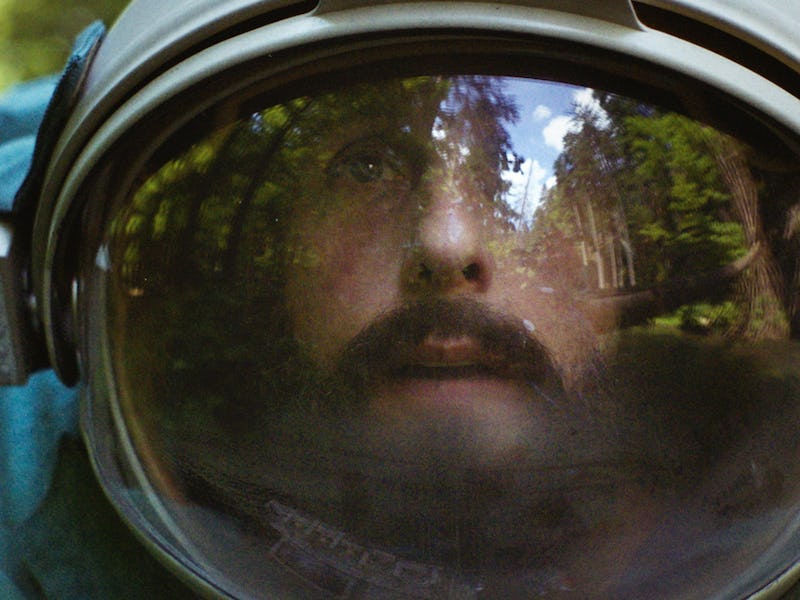Adam Sandler Gives One of His Best Performances in the Overly Subdued Spaceman
Sandler talks to a giant spider in a dour space drama.

Every few years, Adam Sandler emerges from the haze of man-child comedies to prove that he is actually an incredibly talented dramatic actor. For every Big Daddy, there was Punch-Drunk Love, for every Grown Ups, there was The Meyerowitz Stories. But since 2019’s Uncut Gems gave Sandler his closest brush with Oscar love, the actor seems to have gained a renewed interest in stretching his dramatic chops.
Following his turn as a down-on-his-luck NBA scout in 2022’s Hustle, Sandler delivers his most somber and emotionally resonant performance yet in Spaceman, an eerie, moody chamber piece whose success rests squarely on the actor’s hunched shoulders. As a performance vehicle for Sandler, Spaceman is terrific. As a profound, thought-provoking exploration of loneliness, love, and the unbearable weight of existence, it’s a little less successful.
Swedish director Johan Renck helms Spaceman, which follows Sandler’s Jakub Procházka, the “loneliest man in the universe.” Jakub is on a six-month solo mission to investigate a mysterious cosmic phenomenon on the edge of the universe, a task that has begun to wear on him since his wife, Lenka (Carey Mulligan), stopped answering his calls. Losing sleep and on edge from his technician Peter (Kunal Nayyar) frequently brushing off his complaints, Jakub suddenly comes into contact with a giant talking spider (Paul Dano). The spider, which Jakub eventually dubs Hanuš, claims to be an extraterrestrial being nearly as old as the universe itself. While on its intergalactic journey, Hanuš felt drawn to Jakub’s loneliness and hopes to free him from his pain. At first believing himself to be hallucinating, Jakub eventually opens himself up to Hanuš, who resurfaces Jakub’s deepest and darkest memories.
Spaceman is a slow, sparse space drama that prioritizes mood over emotion, which becomes an issue when the film’s climax hinges on a moment of emotional catharsis. But as a strange tone poem in which Adam Sandler chats with a giant spider about loneliness and his greatest regrets, Spaceman is at least singular. It’s in those moments when a weary, broken Sandler is alone, opposite a CGI spider, that Spaceman inches toward something profound.
Jakub is barely a shell of a man, reduced to his mission and the cheesy promotional spiels his sponsors force him to repeat like he’s the star of a new-age Truman Show in space. Dehumanized by his bosses and iced out by the one person he loves, Jakub can only rediscover his humanity with the help of Hanuš, who has a peculiar ability to show Jakub flashes of his most powerful memories, most of them revolving around Lenka or his father. Sandler is fantastic in these scenes, conveying a bone-deep weariness through his slow movements and even slower speech, as if the words were fighting to get out of his mouth. Even as his vague Czech accent constantly slips, Sandler manages to give a soulful, sad performance as a man on the edge of his own personal oblivion.
Adam Sandler is exceptional in Spaceman, even if the rest of the film doesn’t quite measure up.
However, the rest of the film is a little too subdued. Renck, best known for directing the acclaimed HBO miniseries Chernobyl, brings the same kind of solemn austerity to Spaceman, which suffers for it — why have a movie in which Adam Sandler talks to a giant spider if you won’t lean into the inherent weirdness? Renck instead prioritizes dreamy flashbacks and half-remembered memories, alongside starkly-shot scenes on Earth of a heavily pregnant Lenka stewing in resentment for Jakub. Mulligan at least lends a fiery passion to the unforgiving role of the forgotten wife, but each scene is shot so clinically it’s difficult to grow attached to any character in the film. Sometimes Spaceman will dip its toes into cosmic wonder — in one scene Jakub comes into contact with the ancient, intangible space dust he’s investigating — but the film remains otherwise overly cold.
Spaceman is not quite the profound journey it aims to be, but thanks to an exceptional Sandler, it’s not a total misfire. And yet, its glimpses of greatness make one wish for a stranger, bolder movie than this — or else it will be doomed to be forgotten in the annals of Netflix’s streaming algorithm.